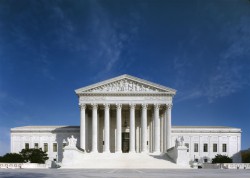Supreme Court May Disappoint Conservatives
Their past decisions may force them to rule against those appealing the John Doe investigation.
The Supreme Court’s Citizens United decision in 2010 has been widely criticized for under-estimating the corrosive role of big money—particularly money from large for-profit corporations–in elections and on elected candidates. The court’s Buckley v Valeo decision in 1976 removed most restrictions on independent spending in campaigns. Citizens United built on Buckley to remove previous restrictions on campaign-related spending by corporations and unions.
Still, the court did acknowledge the potential dangers of corruption. But it took comfort in the belief that independent expenditures would prove less effective than those directed by a candidate’s committee. In its discussions of why corporate spending does not represent a danger, the United Citizens decision twice quotes this excerpt from Buckley v Valeo:
Unlike contributions, such independent expenditures may well provide little assistance to the candidate’s campaign and indeed may prove counterproductive. The absence of prearrangement and coordination of an expenditure with the candidate or his agent not only undermines the value of the expenditure to the candidate, but also alleviates the danger that expenditures will be given as a quid pro quo for improper commitments from the candidate….[I]ndependent advocacy [has] substantially diminished potential for abuse.
Thus Justice Anthony Kennedy, and presumably the other four who joined his majority decision, regarded the lack of coordination as the major bulwark against corruption.
Neither his decision nor Buckley v Valeo spells out why the justices believed the lack of coordination with independent expenditures makes them less useful to the candidate. Presumably they believed the independent efforts might bring up issues the campaign would prefer to de-emphasize or otherwise throw the campaign off its stride. It also appears they believed that by not coordinating with the candidate the independent group would have less opportunity to curry favor once the candidate was elected.
Rather than prohibiting coordination, both decisions treat the lack of coordination as an established fact. This is a bit like someone evaluating a proposed zoo enclosure for a species of birds and noting it was open at the top. If the birds were penguins there would be no need for a top because penguins don’t fly. Similarly, there is little danger of corruption because independent organizations don’t coordinate, and therefore little reason to restrict their activities.
But the Buckley decision did allow much more regulation of independent expenditures that expressly advocated a particular election result. In a famous footnote it explained that this was limited to:
communications containing express words of advocacy of election or defeat, such as “vote for,” “elect,” “support,” “cast your ballot for,” “Smith for Congress,” “vote against,” “defeat,” “reject.”
These phrases are commonly called the “magic words.” Thus an ad that said, “Vote against Smith to stop his plan to raise your taxes” would be express advocacy. One that said “Tell Smith you oppose his plan to raise your taxes” would be considered an issue ad. Clearly the two ads have the same purpose: to defeat Smith, so in some ways the rule is nonsensical. The Buckley decision admits that this limitation is easy to circumvent, but defends it as necessary to avoid vagueness.
The court’s decisions have essentially led to three distinct categories of people trying to influence an election:
- The candidate and the candidate’s committee. These face extensive reporting requirements and limits on contributions.
- Organizations and individuals who work independently of the candidate to influence the election and want to be able to use the use the magic words or their equivalent. These groups, commonly called Political Action Committees, or PACs, face reporting and contribution limits similar to those for the candidate.
- All other groups and individuals who want to influence the election independently of the candidate while avoiding the magic words. These are subject to minimal legal requirements. The Citizens United decision allowed corporations to play in this third category. This third category is often called “dark money,” because it allows unlimited donations by anonymous, typically wealthy donors.
The John Doe Document Dump
The recent John Doe “document dump,” while very incomplete, lays out theories of the prosecutors. It also fills in gaps in the strategy of the Walker allies.
The prosecutors’ theory is found in prosecutor Francis Schmitz’ response to motions to quash the prosecutors’ subpoenas (Exhibit C), which theorizes that there was extensive coordination between Scott Walker’s campaign and a number of independent organizations. It references numerous affidavits to support its suspicions. Since the affidavits were not part of the document dump, it seems premature to speculate on the strength of the evidence obtained so far.
In the document dump, the positions of Walker’s allies are spelled out in detail in Wisconsin Club for Growth leader Eric O’Keefe’s demand for a jury trial (Exhibit 4). The demand runs to 62 pages, but never makes the argument that coordination between the Walker campaign and the various groups did not occur.
It complains that “Liberal groups involved in the Wisconsin recall campaigns conducted precisely the same activities that Schmitz and the other Defendants have identified as justifying an investigation into conservative groups, but there is no John Doe investigation into these groups.” However it never alleges any coordination between the liberal groups and the Tom Barrett campaign.
Federal Judge Rudolph Randa, in his decision to grant an injunction (Exhibit 1) does briefly address the factual issue. He says that “O’Keefe and the Club maintain that they did not coordinate any aspect of their communications with Governor Walker, Friends of Scott Walker, or any other candidate or campaign, and the record seems to validate that assertion.” Other than a footnote referring to a plaintiffs’ exhibit (not included in the document dump), Randa does not explain how the record validates that assertion.
The Judges’ Decisions
The reason Federal Judge Randa gives for not needing to make a factual finding is that:
the phrase “political purposes” under Wisconsin law means express advocacy
Similarly, Wisconsin Judge Gregory Peterson in quashing the prosecutors’ subpoenas, writes:.
I am persuaded the statutes only prohibit coordination by candidates and independent organizations for a political purpose, and political purpose…..requires express advocacy.
Where did the judges get this notion? In Peterson’s case it seems the need for speed trumped the need to take care in interpreting Wisconsin law:
The motions were filed over two months ago, before I was even assigned this case. They are overdue for a decision. This decision will be brief, enabling me to produce it more quickly. Any reviewing court owes no deference to my rationale… For more detail, readers should consult the parties’ briefs.
Rather than explaining his legal reasoning behind his decision, the judge outsources his explanation to one of the parties in the dispute:
Wisconsin Club for Growth’s analysis of the campaign financing statutory scheme is particularly helpful. As the Club explains in its reply brief, the legislature crafted definitions of four key terms: committee, disbursement, contribution and political purposes. All statutory regulations emanate from these four definitions. Before there is coordination there must be political purposes; without political purposes, coordination is not a crime.
The specific analysis the judge refers to was not included in the document dump, but is likely similar to the argument made by O’Keefe’s lawyers in Exhibit 4:
…under Wisconsin law, campaign finance regulation is predicated on communication being for a “political purpose.” This term of art is, in turn, predicated on the communication expressly advocating the election or defeat of a clearly identified candidate. Thus, Wisconsin campaign finance law does not extend to issue advocacy, including the communications made by Plaintiffs.
In essence the judges are saying that the only independent organizations that can’t coordinate with candidates are political action committees. All other independent groups are free coordinate to their hearts’ desire so long as they don’t use the magic words. In other words the O’Keefe lawyers have convinced the judges that there are penguins that fly—independent organizations that coordinate.
A second argument made is a practical one, that coordination on issue advocacy does not create the danger of corruption because, after all, the independent group already agrees with the candidate on the issues. Here is how Judge Randa explains it:
Coordination does not add the threat of quid pro quo corruption that accompanies express advocacy speech and in turn express advocacy money. Issue advocacy money, like express advocacy money, does not go directly to a political candidate or political committee for the purpose of supporting his or her candidacy… A candidate’s coordination with and approval of issue advocacy speech, along with the fact that the speech may benefit his or her campaign because the position taken on the issues coincides with his or her own, does not rise to the level of “favors for cash.” Logic instructs that there is no room for a quid pro quo arrangement when the views of the candidate and the issue advocacy organization coincide.
One problem with this statement is it equates the lack of the magic words with issue advocacy. As the Supreme Court itself noted, it is easy for an organization that wants to influence an election to avoid the words without diluting its message.
Also there is no guarantee that the independent organizations will not also have a desire to gain favor with the candidate. All one need do is look at one of the other organizations caught up in the John Doe investigation: United Sportsmen of Wisconsin. How much of their involvement was motivated by agreement on the issues versus a hope that the good will gained by its donations to support Republicans would help the group win a contract with the Department of Natural Resources? This is exactly what happened, leading to weeks of controversy, until Gov. Walker cancelled the contract.
Wisconsin’s Election Laws
Let’s take a look at the Wisconsin statutes on elections. Here is how they define “political purposes,” the phrase the two judges and the Wisconsin Club for Growth’s attorney hang their hats on:
An act is for “political purposes” when it is done for the purpose of influencing the election or nomination for election of any individual to state or local office, for the purpose of influencing the recall from or retention in office of an individual holding a state or local office, for the purpose of payment of expenses incurred as a result of a recount at an election, or for the purpose of influencing a particular vote at a referendum.
Acts which are for “political purposes” include but are not limited to:
-
The making of a communication which expressly advocates the election, defeat, recall or retention of a clearly identified candidate or a particular vote at a referendum.
-
The conduct of or attempting to influence an endorsement or nomination to be made at a convention of political party members or supporters concerning, in whole or in part, any campaign for state or local office.
The problem here is that “political purposes” has been asked to do double duty in Wisconsin. On the one hand it is used as defined above, encompassing everything a normal campaign would do to elect a candidate or affect a recall. Besides expressly advocating the election or defeat of a clearly identified candidate, these might include soliciting donations, compiling lists of voters, ordering opinion polls, and communications both express and implicit.
Trouble came because Wisconsin used the same phrase to determine which organizations were required to register as PACs. Courts ruled that the phrase was too vague to make this determination. Thus the two uses of the phrase became incompatible.
The solution adopted by the Government Accountability Board was to issue new regulations that defined “political purpose” using the magic words. When applied to deciding who has to register as a PAC, this second formulation solves the problem of compatibility with the Buckley decision.
But if the same formulation is applied to other portions of Wisconsin election law it makes hash of them. For example, another section of the law reads:
No person, committee or group may make or authorize a disbursement or the incurrence of an obligation from moneys solicited for political purposes for a purpose which is other than political, except as specifically authorized by law.
This section is obviously written to prevent conversion of money contributed for a campaign to personal use. But if “political purposes” were limited to express advocacy under the restrictive definition, a campaign that ordered a poll would be violating Wisconsin law.
What Happens When the Flying Penguins meet the Supreme Court?
It will be interesting to see what happens when the Supreme Court is confronted with the flying penguins—organizations that claim they can be independent of a candidate even while coordinating with that candidate. Will the court be receptive to their argument?
One view—shared by a majority of Americans according to a recent poll—is that the court’s decisions are often more political and ideological than legal. This view suggests that Judge Randa’s position would be upheld as the conservative majority flexes it muscles. As Bruce Murphy describes in a recent article, the John Doe investigation has been seized upon by ideological groups on the right with an agenda to eliminate the few remaining limits on campaign spending.
In essence, O’Keefe is saying groups like Club for Growth can collect unlimited donations from anonymous donors and then coordinate the spending of this dark money with campaigns because the Club doesn’t use the magic words. But that scenario would open the door to a flood of conservative and liberal “independent” group spending done in coordination with candidates.
As a result, future campaigns would likely to be drastically different than today. Both Republican and Democratic campaigns will consist of a fairly small candidate campaign organization subject to all of today’s restrictions on contributions, with a much larger annex of independent groups, with no contribution limits or donor identity required. Candidate committees will likely have daily teleconferences with independent groups to coordinate their activities, and elected candidates will be fully aware of the policy preferences of these independent groups when voting on future legislation.
This presents a fundamental problem for the Supreme Court, and for the notion that the justices will simply vote based on their political views. Doing so would require them to admit that their assumption in Citizens United, borrowing from Buckley — that an effort cannot be both independent and coordinated with the candidate — is false. In the process they would make a mockery of their assurance that the lack of coordination makes independent expenditures less dangerous. In other words it is asking the authors of the Citizens United decision to turn their back on a key rationale for this decision.
Arguing as Judge Randa does that coordination does not create problems when it is based on agreement on issues rather than a desire for rewards suggests a need to police the motives of organizations coordinating with candidates. For how do we know what their motivations are? Based on the Supreme Court’s rejection of almost every other regulation requiring judgment by the regulators, by declaring it “vague,” I would not expect such a policing proposal to win favor with the court majority.
Another possibility seems most likely to me—that the court declares that birds that can fly are not penguins—in other words, that organizations that coordinate with candidates are not independent. That was their original belief. Why change it now?
Political Contributions Tracker
Displaying political contributions between people mentioned in this story. Learn more.
- September 8, 2018 - Tom Barrett received $200 from John Chisholm
- March 14, 2016 - Tom Barrett received $50 from John Chisholm
Data Wonk
-
Life Expectancy in Wisconsin vs. Other States
 Dec 10th, 2025 by Bruce Thompson
Dec 10th, 2025 by Bruce Thompson
-
How Republicans Opened the Door To Redistricting
 Nov 26th, 2025 by Bruce Thompson
Nov 26th, 2025 by Bruce Thompson
-
The Connection Between Life Expectancy, Poverty and Partisanship
 Nov 21st, 2025 by Bruce Thompson
Nov 21st, 2025 by Bruce Thompson




















